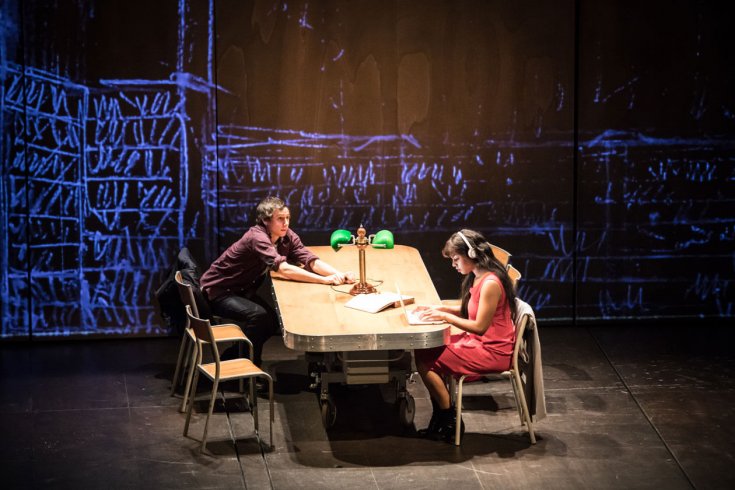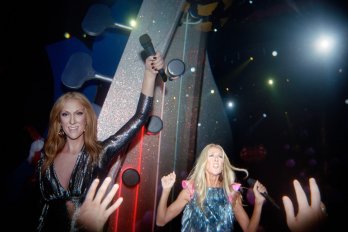In 1518, Hassan Ibn Mohammed Al-Wazzan, a Moroccan ambassador, was captured at sea by Christian pirates. Soon after, the story goes, the pirates realized the value of their prisoner and delivered him to Pope Leo X. The pope was taken by Al-Wazzan’s intellect, and he made the diplomat an offer: convert, and he could have his freedom back. Al-Wazzan’s allegiance was to scholarship, not politics or religion, and he accepted. He lived out much of his life in Italy as Joannes Leo Africanus and wrote numerous popular books. By the seventeenth century, Al-Wazzan was considered one of the most authoritative scholars on Africa.
This obscure figure in diplomatic history has come back to life as a character in—and inspiration for—Tous des oiseaux, the latest play written and directed by Wajdi Mouawad. The Lebanese Canadian playwright is perhaps best known to general audiences as the creator of Incendies, his critically acclaimed play about two Montreal siblings and their journey to the Middle East (it was later made into an Academy Award–nominated film by another top Québécois cultural export, Denis Villeneuve). But over the past three decades and across his body of more than twenty plays, Mouawad has emerged as a singular talent in the theatre world, a war-afflicted existentialist who articulates an Arab interiority that’s rarely been seen on Western stages.
Mouawad’s latest story has been billed as Romeo and Juliet for the Arab-Israeli conflict. In it, a young academic named Wahida, who’s been studying the life and work of Al-Wazzan, falls in love with Eitan, a science major specializing in genetics. Eitan’s Jewish family does not approve of him dating an Arab—not because of her background, they insist, but because she is not Jewish. Eitan feels a deep obligation to his parents, and through his struggle, Mouawad asks how much of a person is determined by who they set out to be and how much is determined by lineage.
The four-hour play cuts back and forth through time, from the 1982 Sabra and Shatila massacres in Lebanon to present-day New York, Berlin, and an Israeli-Jordanian border crossing. Mouawad has long used the past to highlight the central complications of the present moment, guiding his audiences through an Escherian maze of time, family secrets, and the residual traumas of political violence. This talent for re-dressing the classical tenets of drama has breathed new life into one of the oldest artistic disciplines. In Quebec, where he first burst onto the scene in the early 1990s, Mouawad has become one of the most acclaimed playwrights of his generation.
These days, however, Mouawad has made France his home. He developed Tous des oiseaux at Paris’s La Colline theatre, where he has been director since 2016. The play debuted there in November 2017, and its original cast performed it more than 100 times in France and across Europe before it finally made its North American debut this past May at Montreal’s Festival TransAmériques. It is now running through October (as Birds of a Kind) at Ontario’s Stratford Festival, in a newly cast production helmed by Antoni Cimolino.
Upon Mouawad’s Montreal homecoming, Quebec’s La Presse deemed his play, including its exploration of identity politics, to be “beautiful, intelligent and poetic” and declared it “theatre of the (very) highest order.” Long-time followers of Mouawad’s career may not be surprised to hear that the clash between identities and politics that he wrote into his story have also found ways to play out in real life. “We had one translator who worked on the Arabic passages of the text, and as soon as she saw on the theatre’s website that we had the support of the Israeli government, she quit the project because she felt it was dangerous for her and her family in Syria and Iraq,” says Jérémie Galiana, who performs the role of Eitan in the touring production. “When we played four shows in Tel Aviv, the character who plays Hassan Al-Wazzan in the play, who is a Syrian refugee living in Paris, couldn’t come with us. We had to replace him with an Israeli-Arab actor.”
Mouawad’s stories—and the tactics he employs to stage them—have always challenged his audiences to look closely at how the personal and the political intersect, though this does not always work out exactly as intended. His is an uncompromising vision, and in the past, the tensions between the moral dilemmas he brings to the stage and the possibilties that society is willing to accept have gotten him into trouble—Mouawad’s shows have faced political debate, censure, and cancellation. It may be one reason why, eight years ago, Wajdi Mouawad decided to leave Canada behind.
Mouawad was born in 1968, the youngest of three children. His family had lived in the Lebanese mountain village of Deir al-Qamar for centuries but in 1978, three years after the outbreak of civil war, left for Paris. Five years later, Mouawad and his family arrived in Montreal.
The moves left Mouawad feeling unmoored. Because he was the youngest, he saw himself as less connected to his origins compared with his siblings and parents, who were at ease in Arabic in a way that was foreign to him. “In my family, [I am] the one who speaks the best French but the least good Arabic,” he told the French newspaper Libération in 2017. “I find speaking Arabic in public extremely difficult because I’m immediately overwhelmed with emotion. It’s as if I’m haunted by the person I should’ve been, had I not left Lebanon as a child.”
Mouawad began to find his own voice in theatre. He made his way to the National Theatre School of Canada, which he graduated from in 1991. For his production of Macbeth that same year, which was presented as a walking tour of Old Montreal that began at two in the morning, the theatre-criticism journal Jeu simultaneously lauded the young director’s ability to “interrogate the theatrical conventions of time and place” and lamented that his actors had trouble reaching the high benchmarks of their roles.
Over the following decade, he wrote and directed prolifically. In 2000, Mouawad won a Governor General’s Award for his fourth play, Littoral, in which an orphan learns of his biological father’s death and decides to bury his remains in their war-ravaged homeland. With its tapestry of intergenerational family secrets, Littoral communicated the existential tensions between the Middle East and the West.
Not long after its release, Mouawad was named artistic director of the Théâtre de Quat’Sous, the venerable Montreal institution that Michel Tremblay and Robert Lepage once called home. Littoral also exploded in France, allowing Mouawad opportunities abroad for the first time in his career. The play’s resonance only grew after the Middle East was demonized following 9/11 and in the leadup to the Iraq War.
It is 2003’s Incendies, however, that stands out as a contemporary classic. The play, a follow-up to Littoral, tells the story of Québécois twins Jeanne and Simon Marwan, who learn through their mother’s will that they have an unknown brother and estranged father living in Lebanon.
Incendies opened up the possibility of creating a suite of plays about the intersection of origins, exile, and memory, and with its release, Mouawad’s Blood Promises tetralogy began to take shape. He presented his quartet together for the first time at the 2009 Festival d’Avignon in France, and later that year, the French Academy awarded him its Prix du Théâtre for the body of work. In 2007, he rose to the one of the top theatre posts in Canada, artistic director at the National Arts Centre’s French Theatre, and two years later, was named an officer to the Order of Canada.
Then came “l’affaire Cantat.” In 2011, Mouawad cast the French rock musician Bertrand Cantat in his production of Sophocles’s Des femmes at Montreal’s Théâtre du Nouveau Monde. Cantat had been convicted in 2004 of beating actress Marie Trintignant to death in a Lithuanian hotel room. He’d served only four years of an eight-year sentence. Then, in 2010, Cantat’s wife, Krisztina Rády, had died by suicide while he was in the house. The police had investigated her death, but the singer has never been charged.
Mouawad’s choice of a convicted murderer to perform a Greek tragedy that deals with violence against women became the kind of scandal that shakes a career to its foundations. Debate raged in Canada’s cultural world, and soon members of Parliament began to weigh in, calling for Cantat to be banned from entering the country. Mouawad admitted to not having expected the backlash and published an open letter to his three-year-old daughter in Le Devoir in defence of his decision, arguing for the singer’s right to a full reintegration into society and justifying the artistic merit of the choice. “What I found very, very powerful,” he later said in a Radio Canada interview, “is that since [Cantat’s] story is known by everyone, the spectators in the room would necessarily find themselves faced with a man who is contemplating the tragedy of his own life.”
But public sentiment had solidified. On Tout le monde en parle, Quebec’s most popular cultural-affairs program, fellow director Serge Denoncourt asked, “Who does Mouawad think he is, the pope?” The Nouveau Monde announced that it would be removing Cantat from the play, and Mouawad left his post at the National Arts Centre at the season’s end. Not long after, he moved to France.
In the notes to his final season with NAC, he wrote, “The freer an artistic gesture, the freer those who witness it.” Des femmes, with Cantat singing, went on to have a long (though similarly controversial) run in France and across Europe. Mouawad has refused to speak with the Canadian media ever since.
In this country, people tend to wonder just how “Canadian” some artists really are, especially when their international careers take them to heights impossible to attain at home. The fact that France has embraced Mouawad and has elevated his stature since he left Canada has only furthered such grumblings over the last eight years. In reviewing Tous des oiseaux, the culture magazine Spirale plainly asked, “Does Mouawad still merit the title of a Québécois creator?”
Tous des oiseaux arrives in Canada having already won France’s most prestigious theatre award, the Grand Prix de la critique. The excitement the play has generated in Montreal during its sold-out run demonstrates that, among Québécois theatregoers, Mouawad still has a home here should he want it. Though, if Mouawad’s production is any indication, it would seem that he is more internationally minded than ever.
The story unfolds in four languages—English, Hebrew, German, and Arabic—and its multilingual cast was selected after a worldwide search. Language also multitasks as stage design: translations appear on the walls behind the actors, the words as integral to the viewer’s sense of the play as the large rolling table, the shifting walls, and wooden chairs that make up the rest of the set. It has the uncanny effect of placing the audience in each character’s skin.
Like his muse, Hassan Al-Wazzan, Wajdi Mouawad has travelled widely enough to see that identity can be malleable—even if transformation comes at a cost. “Wajdi grew up in Canada. He’s from different parts of the world, but he trained here, and so some part of him is a product of Canada,” says Birds of a Kind director Cimolino. “But I’m not sure he’s ever going to be confined to one place.”





